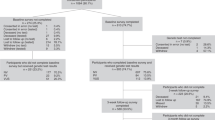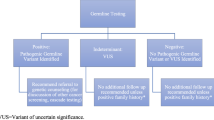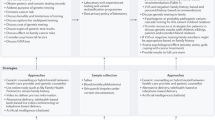Abstract
Background
Germline testing is important in prostate cancer and evaluation can be complex.
Methods
We instituted a monthly multi-disciplinary virtual genetics tumor board (7/2021-3/2022). Participants and panelists were surveyed on usefulness and acceptability.
Results
101 participants attended a session, and 77 follow-up surveys were completed. Over 90% participants and 100% panelists endorsed usefulness of the case discussions and usability of the technology. The majority felt it provided new information they will use.
Conclusions
A multidisciplinary genetics board was successfully developed to address complexity in prostate cancer genetics. The virtual platform may enhance dissemination of expertise where there are regional gaps.
This is a preview of subscription content, access via your institution
Access options
Subscribe to this journal
Receive 4 print issues and online access
$259.00 per year
only $64.75 per issue
Buy this article
- Purchase on Springer Link
- Instant access to full article PDF
Prices may be subject to local taxes which are calculated during checkout
Similar content being viewed by others
References
Loeb S, Giri VN. Clinical implications of germline testing in newly diagnosed prostate cancer. Eur Urol Oncol. 2021;4:1–9.
Paller CJ, Antonarakis ES, Beer TM, Borno HT, Carlo MI, George DJ, et al. Germline genetic testing in advanced prostate cancer; practices and barriers: survey results from the germline genetics working group of the prostate cancer clinical trials consortium. Clin Genitourin Cancer. 2019;17:275–82.e271.
Pillay B, Wootten AC, Crowe H, Corcoran N, Tran B, Bowden P, et al. The impact of multidisciplinary team meetings on patient assessment, management and outcomes in oncology settings: a systematic review of the literature. Cancer Treat Rev. 2016;42:56–72.
Hijazi MA, Prebay ZJ, Johnson A, Wilder S, Patel A, Mehra R, et al. Utilization of a virtual tumor board for the care of patients with renal masses: experience from a quality improvement collaborative. Urol Pract. 2023;10:380–8.
Valerio MR, Serretta V, Arico D, Fazio I, Altieri V, Baldari S, et al. A prospective observational study on the structuring process and implementation of a large regional, inter-hospital, virtual multidisciplinary tumor board on prostate cancer. Anticancer Res. 2023;43:501–8.
Loeb S, Byrne N, Walter D, Makarov DV, Wise DR, Becker D, et al. Knowledge and practice regarding prostate cancer germline testing among urologists: Gaps to address for optimal implementation. Cancer Treat Res Commun. 2020;25:100212.
Giri VN, Walker A, Gross L, Trabulsi EJ, Lallas CD, Kelly WK, et al. Helix: a digital tool to address provider needs for prostate cancer genetic testing in clinical practice. Clin Genitourin Cancer. 2022;20:e104–13.
Loeb S, Sanchez Nolasco T, Siu K, Byrne N, Giri VN. Usefulness of podcasts to provide public education on prostate cancer genetics. Prostate Cancer Prostatic Dis. 2023;26:772–7.
Funding
The ENGAGEMENT study was supported by the Department of Defense (080-27000-X17501).
Author information
Authors and Affiliations
Contributions
Conceptualization SL, HHC, CP, LG, VNG, Methodology SL, LG, SWK, AR, VNG, Formal Analysis AR, Investigation All authors, Data curation LG, Writing original draft SL, Writing review and editing All authors, Supervision VNG, Funding acquision SL, VNG.
Corresponding author
Ethics declarations
Competing interests
SL reports prior equity in Gilead, unrelated to this publication. HHC reports research funding to institution from Astellas, Clovis Oncology, Color Foundation, Janssen, Medivation, Promontory Therapeutics, Sanofi; Consultant to AstraZeneca; Royalties from UpToDate. CJP reports consulting for Bayer. FH reports educational consultant for AstraZeneca. The remaining authors report no relevant COI.
Additional information
Publisher’s note Springer Nature remains neutral with regard to jurisdictional claims in published maps and institutional affiliations.
Supplementary information
Rights and permissions
Springer Nature or its licensor (e.g. a society or other partner) holds exclusive rights to this article under a publishing agreement with the author(s) or other rightsholder(s); author self-archiving of the accepted manuscript version of this article is solely governed by the terms of such publishing agreement and applicable law.
About this article
Cite this article
Loeb, S., Cheng, H.H., Paller, C.J. et al. Addressing gaps in healthcare provider knowledge regarding germline testing for prostate cancer through development and testing of a virtual genetics board. Prostate Cancer Prostatic Dis (2024). https://doi.org/10.1038/s41391-023-00778-9
Received:
Revised:
Accepted:
Published:
DOI: https://doi.org/10.1038/s41391-023-00778-9



